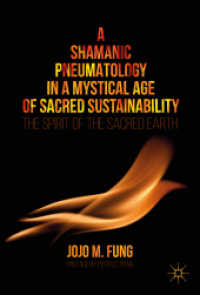Full Description
Refocusing Ethnographic Museums through Oceanic Lenses offers a collaborative ethnographic investigation of Indigenous museum practices in three Pacific museums located at the corners of the so-called Polynesian triangle: Bernice Pauahi Bishop Museum, Hawai'i; Museum of New Zealand Te Papa Tongarewa; and Museo Antropológico Padre Sebastián Englert, Rapa Nui. Since their inception, ethnographic museums have influenced academic and public imaginations of other cultural-geographic regions, often resulting Euro-Americentric projection of anthropological imaginations has come under intense pressure, as seen in recent debates and conflicts around the Humboldt Forum in Berlin, Germany. At the same time, (post)colonial renegotiations in former European and American colonies, such as the cases in this book, have initiated dramatic changes to anthropological approaches through Indigenous museum practices. The book shapes a dialogue between both situations—Euro-Americentric myopia and Oceanic perspectives—by offering historically informed, ethnographic insights into Indigenous museum practices grounded in Indigenous epistemologies, ontologies, and cosmologies. In doing so, the book employs Oceanic lenses that help to reframe Pacific collections in, and the production of public understandings through, ethnographic museums in Europe and the Americas.
Following this line of reasoning, Refocusing Ethnographic Museums sets out to offer insights into Indigenous museologies across Oceania to recalibrate ethnographic museums, collections, and practices through Indigenous Oceanic approaches and perspectives. This, in turn, should assist any museum scholar and professional in rethinking and redoing their respective institutional settings, intellectual frameworks, and museum processes when dealing with Oceanic affairs; and, more broadly, in doing the "epistemic work" needed to confront "coloniality," not only as a political problem or ethical obligation, but "as an epistemology, as a politics of knowledge." A distinctive feature is the book's layered coauthorship and multi-vocality, drawing on a collaborative approach that has put the (widespread) philosophical commitment to dialogical inquiry into (seldom) practice by systematically co-constituting ethnographic knowledge. In doing so, the book shapes an "ethnographic kaleidoscope," proposing the metaphor of the kaleidoscope as a way of encouraging fluid ethnographic engagements to avoid the impulse to solidify and enclose differences, and remain open to changing ethnographic meanings, positions, performances, and relationships. The coauthors collaboratively mobilize Oceanic eyes, bodies, and sovereignties, thus enacting an ethnographic kaleidoscopic process and effect aimed at refocusing ethnographic museums through Oceanic lenses.







